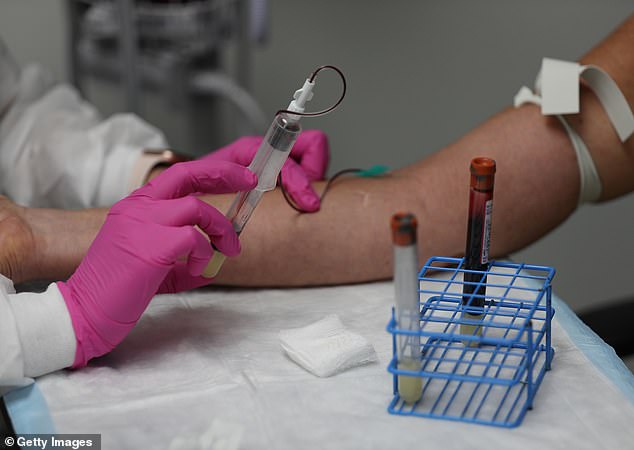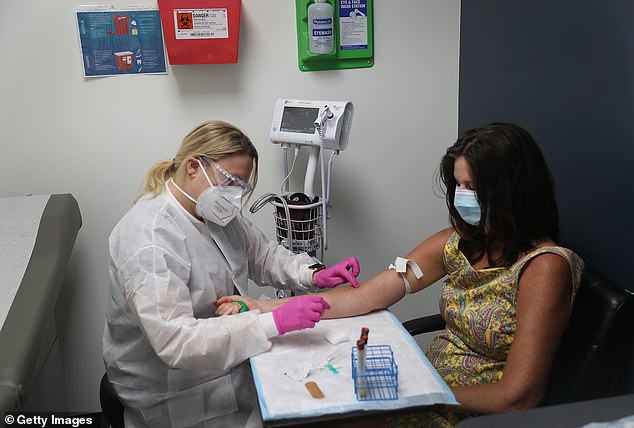New experimental coronavirus vaccine prevented severe disease in mice after two doses of the jab boosted their antibody levels 90-fold
- Researchers genetically modified vesicular stomatitis virus (VSV), which causes a mild illness in livestock, to become a vaccine
- The team took out a gene from VSV and inserted the spike protein from the coronavirus, which it uses to infect human cells
- Mice given one dose of the experimental jab had high levels of neutralizing antibodies, but those given two doses had their levels boosted 90-fold
- After spraying the virus into the noses of the mice, those who were immunized didn’t develop pneumonia or have high level of particles in their lungs
- Rodents given a placebo had high levels of the virus in their lungs and more signs of inflammation
An experimental vaccine helped prevent severe disease in mice infected with the novel coronavirus, a new study says.
Researchers found that five weeks post-immunization, after the rodents were exposed to COVID-19, there were no detectable virus particles in their lungs.
What’s more, after two doses, the levels of neutralizing antibodies in mice were boosted by 90-fold, the team, from Washington University School of Medicine in St Louis, found.

Mice given one dose of an experimental jab that combined coronavirus and another virus had high levels of neutralizing antibodies, but those given two doses had their levels boosted 90-fold. Pictured: Leyda Valentine takes blood from Lisa Taylor as she participates in a COVID-19 vaccination study at Research Centers of America on August 7, in Hollywood, Florida

After spraying the virus into the noses of the mice, those who were immunized didn’t develop pneumonia or have high level of particles in their lungs. Pictured: Leyda Valentine (left) takes blood from Lisa Taylor (right) during a coronavirus vaccine trial in Florida, August 7
‘Unlike many of the other vaccines under development, this vaccine is made from a virus that is capable of spreading in a limited fashion inside the human body, which means it is likely to generate a strong immune response,’ said co-senior author Dr Michael Diamond, a professor of molecular microbiology, pathology and immunology.
‘Since the virus is capable of replicating, it can be grown to high levels in the lab, so it’s easy to scale up and should be more cost-effective than some of the other vaccine candidates.’
For the study, published in the journal Cell Host and Microbe, the team genetically modified vesicular stomatitis virus (VSV), which caused a mild illness in livestock.
Researchers removed one gene from VSV and inserted the spike protein from SARS-CoV-2, which the virus used to infect human cells.
They named the hybrid virus VSV-SARS-CoV-2, which they hoped would elicit antibodies against the spike protein and protect against later infection.

This is the same strategy that was used to develop the Ebola vaccine – made from VSV and inserted with an Ebola gene – that was approved by the US Food and Drug Administration in 2019.
Next, mice were injected with the experimental vaccine, and a subgroup was given a second jab four weeks later.
Three weeks after each injection, the researchers drew blood to test for antibodies.
Results showed high levels of antibodies after one dose, but the group that was given a second dose had their levels spike 90-fold.
Then, the researchers sprayed COVID-19 into the noses of the mice five weeks after their last shot.


Four days after the mice were exposed to the virus, there were no detectable particles in their lungs after either one or two doses nor did any get pneumonia.
By comparison, rodents that had been given a placebo had high levels of the virus in their lungs and more signs of inflammation.
While the data is promising, this experimental vaccine is still in the early stages of developed and much more testing for safety and efficacy is needed.
‘It’s really going to depend on how successful the first vaccines that come out for COVID are,’ said co-senior author Dr Sean Whelan, head of the Department of Molecular Microbiology, at Washington University School of Medicine.
‘If they don’t produce a robust, durable immune response or there are safety issues, there might be the opportunity for a second-generation vaccine that could induce sterilizing immunity and interrupt the cycle of transmission.’

